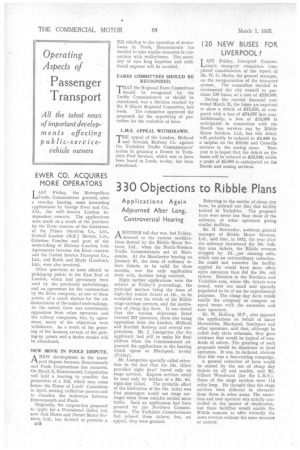330 Objections to Ribble Plans
Page 52

If you've noticed an error in this article please click here to report it so we can fix it.
Applications Again Adjourned After Long, Controversial Hearing ANOTHER full day was, last Friday, devoted to the various modifications desired by the Ribble Motor Services, Ltd., when the North-Western Traffic Commissioners sat at Morecambe. At the Manchester hearing on January gl, the issue of ordinary return tickets, to be valid for three months, was the only application dealt with, decision being reserved.
Eight further applications were the subject of Friday's proceedings, the principal matters being the issue of eight-day tourist tickets at 15s., to be available ever the whole of the Ribble stage-carriage services, and the institution of cheap day fares. It was stated that the various objections listed covered 327 operators, there also being opposition from the London, Midland and Scottish Railway and several corporations. Mr. J. Lustgarten (for the applicant) had still to make his final address when the Commissioners adjourned the applications to the hearing which opens at Blackpool, to-day (Friday).
Mr. Lustgarten specially called attention to the fact that the 15s. ticket provided eight days' travel only on stage services. Express serVices cduld be used only by holders of a 32s. 6d.
eight-day ticket, The probable effect of the institution of the 15s. ticket was that passengers would use stage carriages when those vehicles needed more traffic. Such an application had been granted by the Northern Commissioners. The Yorkshire Commissioners had refused these tickets, but, on appeal, they were granted. Referring to the matter of cheap day fares, he pointed out that this facility existed in Yorkshire. The proposed fares were never less than those of the railways, or other operators giving similar facilities.
Mr. H. Bottomley, assistant general manager of Ribble Motor Services, Ltd., said that, in 1932, the year after the railways introduced the 10s. holiday area tickets, the Ribble revenue dropped by .7d. per running mile, which was an extraordinary reduction. He could not conceive the facility applied for would have more effect upon operators than did the 10s. rail tickets. Districts in the Northern and Yorkshire area, where 15s. tickets were issued, were too small and sparsely populated to be of use for experimental purposes. The cheap day fares would enable the company to compete on equal terms with the excursion and tour operators.
Mr. W. McKeag, M.P., who opposed the applications on behalf of many Morecambe, Blackpool, Southport and other operators, said that, although he called only three witnesses, they gave evidence that would be typical of hundreds of others. The granting of such proposals would be disastrous to local operators. It was, he declared, obvious that this was a fare-cutting campaign.
A general reduction of fares would be caused by the use of cheap day tickets by all and sundry, said Mr. Gilbert Woodward (for the L.M.S.). Some of the stage services were 114 miles long. He thought that the stage services were different in character from those in other areas. The excursion and tour operator was strictly controlled in the matter of duplication, but these facilities would enable the Ribble con,cern to offer virtually the same services without the same measure of control.




























































































